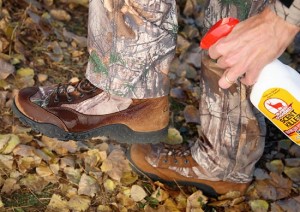 Scent Control vs. Scent Reduction
Scent Control vs. Scent Reduction
Understanding how to control or reduce human scent is key to success in bowhunting. Unlike humans, with our flat faces with cute little noses, the deer’s entire face and head is built around one gigantic nose and several inches of nasal passageway. Deer use their nose continually to survive, first by detecting danger at far distances, second to sniff out food, and third to sniff out a mate. But don’t despair. The fact that deer have such amazing sense of smell is the only reason they even still exist at all here in the future. As hunters we should admire its prowess and design. We want deer to survive…so that we can hunt them!
Human scent—or odor—is managed in three different ways: Scent masking, scent reduction, and scent control. Scent masking means using other scents—such as deer urine, pine extract, or sage—to cover up human odor. I rarely use scent masking so I’ll leave it out of this article. Instead let’s look at scent control verses scent reduction.
First off, total scent control—aka “scent elimination”—is really impossible. No matter what measures you take to eliminate human scent, you’ll still ooze some amount of odor, especially after a few days living in the woods. The only fool-proof way to control human scent is by using the wind to carry your scent away from your intended quarry. After 25 years in the field I’ve come to realize that scent control is impossible by any means other than wind. But winds can and do change direction. Therefore, 100% scent control is still impossible. That being said, I’m a firm believer in scent reduction.
Scent reduction means using commercial chemical or enzymatic odor neutralizing sprays, soaps, wipes, and special clothing to neutralize odor on your body and gear. In my experience scent reduction efforts are only marginally effective, but it does give me a little peace of mind.

For many years I’ve washed my clothes and body in scent masking soap before each hunt, and then used scent neutralizing spray at camp. Yet I am continually amazed at deer’s ability to pick me off no matter what precautions I use. When the wind is bad, it’s over, plain and simple. Your slightest human scent can blow out an entire canyon before you even step foot in it. Although I can’t completely eliminate my scent, I know that a reduced scent won’t travel as far, and if the wind changes momentarily, perhaps it will be diluted enough to go unnoticed, allowing me edge a little closer to the buck.
One reason we have such a hard time eliminating odor is because of the tremendous amount of gear we carry into the field that hasn’t been adequately washed down with scent control products. I recently began taking inventory of some of these items:
• Wrist watch
• Belt
• Boot insoles/lining
• Gum
• Every single content of your backpack
• Wallet/keys
• Chapstick
• Water bottle
• Food/snacks
• Phone/GPS
• Binoculars and harness
• Rangefinder and case
• Bow
• Armguard/Release aid
• Sweat/skin/hands/pores
• Hair
• Mouth/Breath/Lungs
Did I miss anything? Probably. Now let’s look closer at some of these items:
Mouth: To keep my mouth from running afoul, I chew gum in the field. But I don’t brush my teeth in the field, and I’m always breathing. Does the inside of your lungs have an odor? Not to you, but probably to the deer. Just by breathing you are continually announcing your presence to the woods.
Boots: No matter how much scent masking spray you use on your boots, the boots still breathe with each step. Go ahead and stick your face in your boot. Do you smell your sweaty insoles? Does the lining or the leather have an odor? Probably. And the deer can smell it too.
Skin: Your skin has pores which seep sweat and oil continuously. Even if you wash your hands before going afield, an hour or so later they’ll be dirty again. And a few hours after that, they are grimy and stinky. Fortunately, several companies sell special scent wipes for field use, but I don’t use them. I have enough junk in my pack already, and even then, your hair is continually accumulating oil and dirt just by sitting there.
You get the idea.
So, what can you do? Don’t obsess over scent control. Trust me; you’ll go nuts trying to mask everything. Really, how fun is it to spend hours washing and wiping down your Chapstick, keys, binos, arrows, wallet, etc?! The deer will still sniff out something else.

Since pure scent elimination is really impossible, efforts to reduce scent are two-fold: First, keep the wind in your face and plan your stalks according to wind direction whenever possible. Second, use commercial scent masking products such soaps, deodorizers, and sprays. Go ahead and use whatever magical scent masking product you wish, but don’t count on it to save the day. My advice is to spare your obsession with scent control and focus on hunting skills instead.
